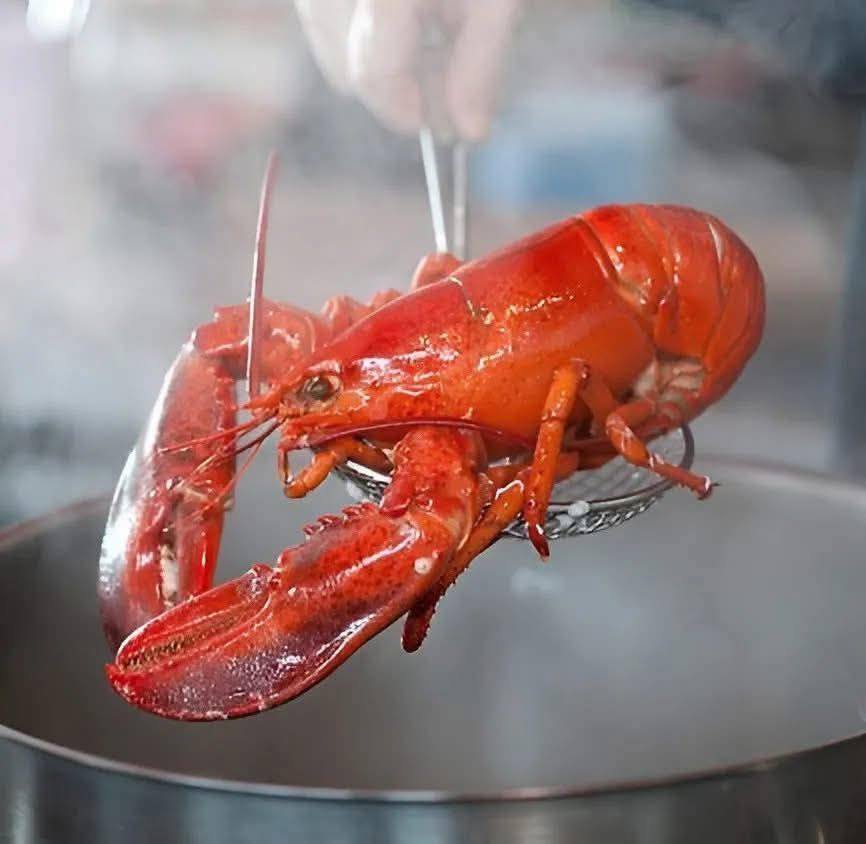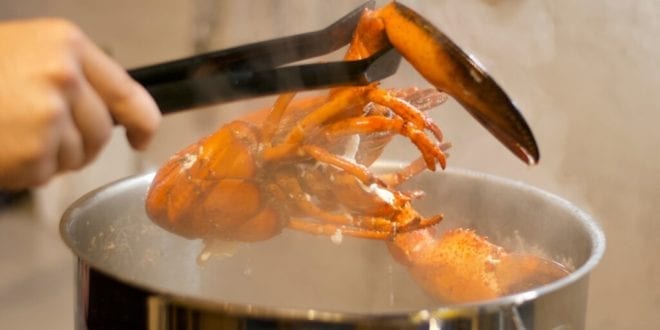The Silent Agony: Rethinking the Ethics of Boiling Lobsters Alive

In the culinary world, lobster is often hailed as a luxury delicacy—served at high-end restaurants, savored during special occasions, and associated with gourmet sophistication. Yet behind the elegant plating and rich flavors lies a harrowing truth: the traditional method of cooking lobsters—by boiling them alive—is one of the most painful and inhumane ways to end a sentient creature’s life.
The image of a bright red lobster being lifted from a pot of steaming water may seem unremarkable to many. It’s a familiar scene in cooking shows and seafood festivals. But if we peel back the layers of culinary normalization, we confront a reality that is far from appetizing. This essay explores the ethics, biology, legal frameworks, and growing movement against the practice of boiling lobsters alive, calling into question our relationship with the animals we consume.
A Misunderstood Creature
Lobsters are marine crustaceans that have roamed the ocean floors for over 100 million years. Despite their alien appearance, lobsters are complex, sensitive beings. They possess a decentralized nervous system and hundreds of thousands of sensory neurons that allow them to feel changes in temperature, pressure, and, crucially, pain.
Contrary to popular belief, lobsters do not have simple reflexes or lack awareness. Scientific studies have demonstrated that lobsters show avoidance behaviors, exhibit signs of learning and memory, and respond to stimuli in a manner that suggests conscious processing. Dr. Robert Elwood, a leading animal behaviorist, conducted experiments indicating that crustaceans, including lobsters, are capable of experiencing pain—not just nociception (a simple reflex to harmful stimuli), but actual suffering.
This is critical to understanding the cruelty involved in boiling a lobster alive. Unlike some animals that may lose consciousness quickly, lobsters remain aware as their organs are slowly destroyed by heat. The hard exoskeleton that protects them in the wild becomes a cruel prison during the cooking process, prolonging their agony.

The Sound of Suffering
One of the most haunting aspects of cooking lobsters is the sound heard as they boil. Many mistake it for a scream, which leads to heated debates over whether lobsters can vocalize. While it is true that lobsters do not possess vocal cords, the high-pitched sound emitted during boiling is steam escaping from tiny pores in the shell.
However, the absence of a scream does not equate to the absence of suffering. It merely highlights a limitation in the animal’s anatomy, not a lack of experience. In fact, the inability of lobsters to cry out may make their suffering even more tragic—they endure unspeakable pain in silence, often dismissed as mere food rather than living beings.
The Process of Boiling Alive
To truly grasp the cruelty of boiling lobsters alive, one must understand what happens during the process. When plunged into boiling water, the lobster experiences a rapid and violent rise in temperature. Its nervous system begins to overload, triggering muscle spasms, desperate movements, and a fight to escape the pot.
Internally, the lobster’s organs start to disintegrate due to the extreme heat. The brain, located between the eyes, may take up to two minutes to stop functioning completely. Meanwhile, the animal remains trapped in its exoskeleton, fully conscious, undergoing what can only be described as a living cremation.
Such a method of death is not only painful but prolonged. Unlike stunning or quick slaughter methods used for some land animals, boiling alive offers no form of anesthesia or mercy. It is a raw execution, hidden behind culinary tradition and aesthetic plating.
Legal and Ethical Shifts Around the World
Thankfully, awareness is growing. Several countries and regions have begun to reevaluate the legality and morality of boiling lobsters alive. In 2018, Switzerland passed legislation requiring lobsters to be stunned before cooking. The law mandates electrical stunning or mechanical destruction of the brain to ensure the animal does not feel pain during cooking.
Similarly, New Zealand has recognized decapod crustaceans as sentient beings, extending certain welfare protections to them. The United Kingdom also moved to include lobsters, crabs, and octopuses in its Animal Welfare (Sentience) Bill, acknowledging their capacity to feel pain.
These changes reflect a broader societal shift. As scientific evidence mounts and public awareness increases, more people are questioning the ethical implications of causing such suffering for the sake of flavor. These reforms are not only legal victories but moral acknowledgments that animal suffering should not be invisible simply because the victims lack a voice.
Alternatives to Boiling
For those who still choose to eat lobster, more humane methods of preparation are available. Stunning devices, such as the Crustastun, use electrical current to render the lobster insensible within seconds. Chilling the lobster in a freezer or ice slurry prior to cooking can also reduce its stress and numb its pain receptors, although this method is less reliable.
Some chefs have adopted the practice of quickly splitting the lobster’s head before cooking to sever its main nerve centers. While this method is still debated, it is widely considered more humane than boiling alive.
Furthermore, plant-based seafood alternatives are gaining popularity. Companies are now producing lobster analogs made from soy, konjac, and pea protein, offering cruelty-free options that mimic the taste and texture of real shellfish.
The Role of Culinary Culture
Why, then, does the practice persist?
Much of the answer lies in culinary tradition. For centuries, boiling alive was seen as the best method to preserve the lobster’s freshness and avoid spoilage. Chefs and seafood vendors believed that killing the lobster beforehand could lead to enzymatic changes, affecting taste and texture. Additionally, many consumers have never questioned the process, either out of ignorance or desensitization.
Cultural inertia, however, is not a valid justification for cruelty. Just as past societies abandoned brutal practices like live animal dissections and public executions, modern cuisine must evolve. Fine dining should not come at the cost of silent suffering.
Chefs have an especially vital role in leading this change. By refusing to cook lobsters alive, by educating patrons, and by exploring humane alternatives, culinary professionals can shift norms and set new standards for ethical cooking.
Philosophical Reflections
At the heart of the debate lies a philosophical question: What right do we have to inflict suffering on another sentient being for the sake of our palate?
Humans have historically drawn moral boundaries between species—caring for dogs and cats while consuming pigs and chickens. With lobsters, the justification often rests on their alien appearance or presumed lack of intelligence. But pain is not dependent on aesthetics. If a being can suffer, it deserves consideration.
The philosopher Jeremy Bentham once wrote, “The question is not, Can they reason? nor, Can they talk? but, Can they suffer?” Lobsters, despite their silence and unfamiliarity, suffer deeply when boiled. Ignoring their pain is a moral failure—a blind spot in our empathy.
Toward a More Compassionate Future
The movement against boiling lobsters alive is part of a larger awakening. As societies evolve, so too does our understanding of animal welfare. What was once tradition can be reevaluated. What was once acceptable can become unthinkable.
Consumers have more power than they realize. By choosing not to support inhumane practices, by asking restaurants about their preparation methods, and by spreading awareness, individuals can drive change. Governments, too, must continue to listen to scientific evidence and enact laws that protect all sentient life—not just the ones that bark or meow.
Food can and should be a source of joy, culture, and community. But let it also be a reflection of our values. Let the image of the lobster being lifted from boiling water not be a symbol of indulgence, but a reminder: every bite carries a story—and we choose how that story ends.
Conclusion
Boiling lobsters alive is a practice rooted in outdated tradition, convenience, and misinformation. Science confirms that lobsters feel pain, experience stress, and suffer immensely during this cooking process. As public awareness grows and legal frameworks begin to reflect evolving ethics, it’s time for both individuals and institutions to rethink how we treat these silent, ancient creatures.
A more compassionate world is not only possible—it is necessary. We owe it to ourselves, to future generations, and to the beings who cannot speak for themselves. It’s time to turn down the heat—literally and morally—and choose kindness, even at the dinner table.











